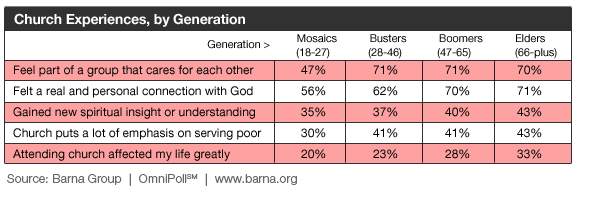The Barna Group recently conducted a poll about the impact of church experiences. The results of this poll show that the size of the church attended had little or no effect on the way respondents characterized their experience, but the generation of the respondents had a considerable impact:
So What?
This survey included over 1,000 American adults who “have attended a Christian church sometime in the past.” In general, Mosaics and Busters (groups covering those from age 18-46) scored lower in all categories than did Boomers and Elders (groups covering those ages 47 and greater). These results are consistent with other surveys showing measures of religiosity rise as people age.
- How do your answers compare with those polled who are a part of the same generation?
- Why do you think older generations tend to have higher percentages on this survey as well as most other measures of religious belief and practice? Do you think this will remain true as the Mosaiscs and Busters age? Why or why not?
- Does your congregation consider generation differences when constructing intentionally intergenational events, including weekly worship services? If so, how?
